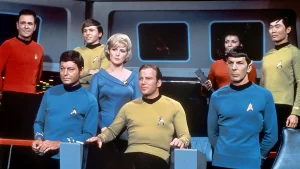.
I become Medicare-aged next year, and so to me Star Trek always means the original series and the original crew. Amid the adding and subtracting of cast and the morphing future history of the United Federation of Planets, one of the constants was the friendly combative relationship between Spock, the reportedly unemotional half-Vulcan, and the ship’s chief admitted sensualist and emotional heart of the crew, Medical Officer Dr. Leonard “Bones” McCoy. McCoy continually needled Spock over his unemotional nature, his strangely colored green blood, and his distinctive appearance as the alien among humans. Spock usually responded in kind with a simply delivered but devastating remark that any observer could judge as victory in their mutual burn contests. Underneath the jibes and jabs was a foundation of deep respect, loyalty, and friendship, displayed most clearly in “Amok Time” when Spock invited McCoy, along with Kirk, to the very private Vulcan wedding ceremony.
What has fascinated me of late is watching younger people, usually those born in the early 90s, discover and react to the original series episodes and how they interpret Bones’ behavior toward Spock. They see it as inappropriate and borderline racist.
They aren’t entirely wrong.
The fact that Vulcans are fictional gives us some distance from the nature of Bones’ ribbing and cutting remarks, but the truth is that if he said similar things about real people and real races, we would be horrified. Denigrating comments about someone’s appearance or culture are something that is far less acceptable today than sixty years ago.
Growing up with these characters, we understood that there was and is a deep respect and love between them. We knowthat McCoy or Spock would lay down their lives to save the other, and that this surface tension is mere “play fighting.” It is not unlike comments my friends and I have made to each other over the years, but when it slides into observations based on biology, that crosses the line.
It gives me hope that the past is seen this way by the generations replacing us.

